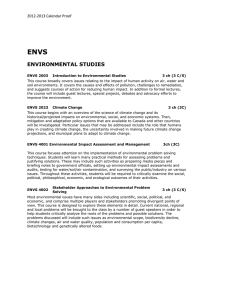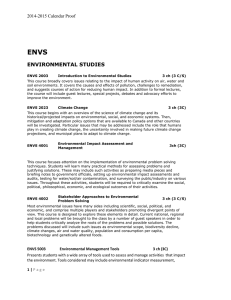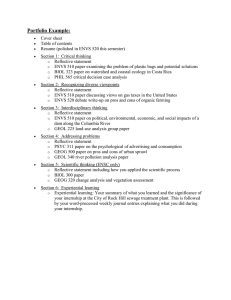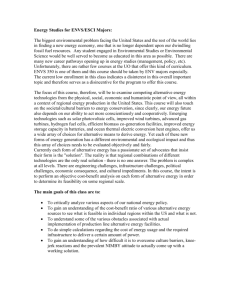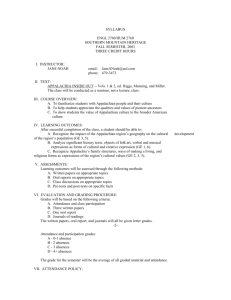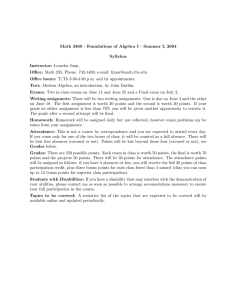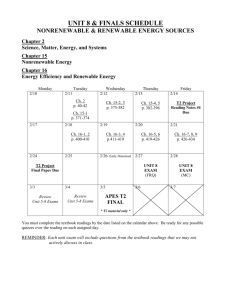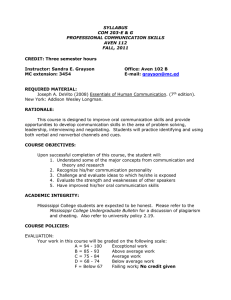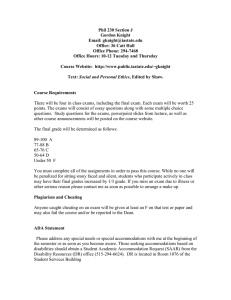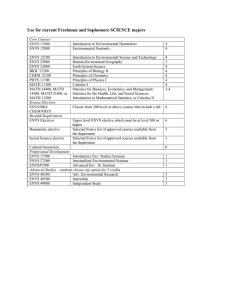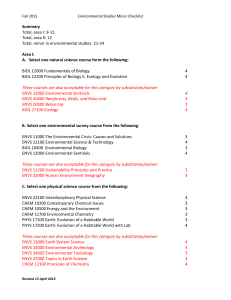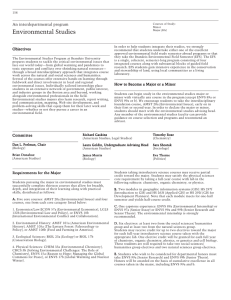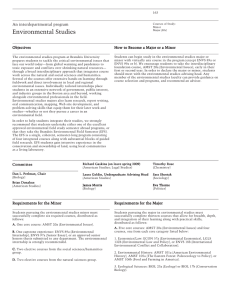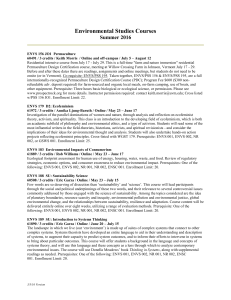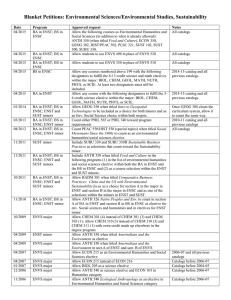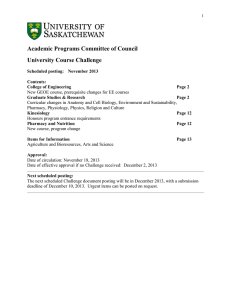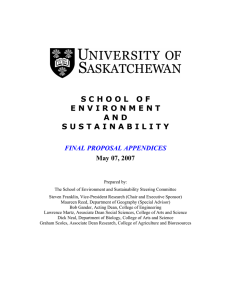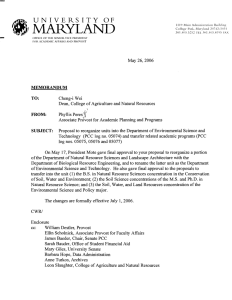EnvS 3330: Environment & Society Syllabus for Spring 2007
advertisement
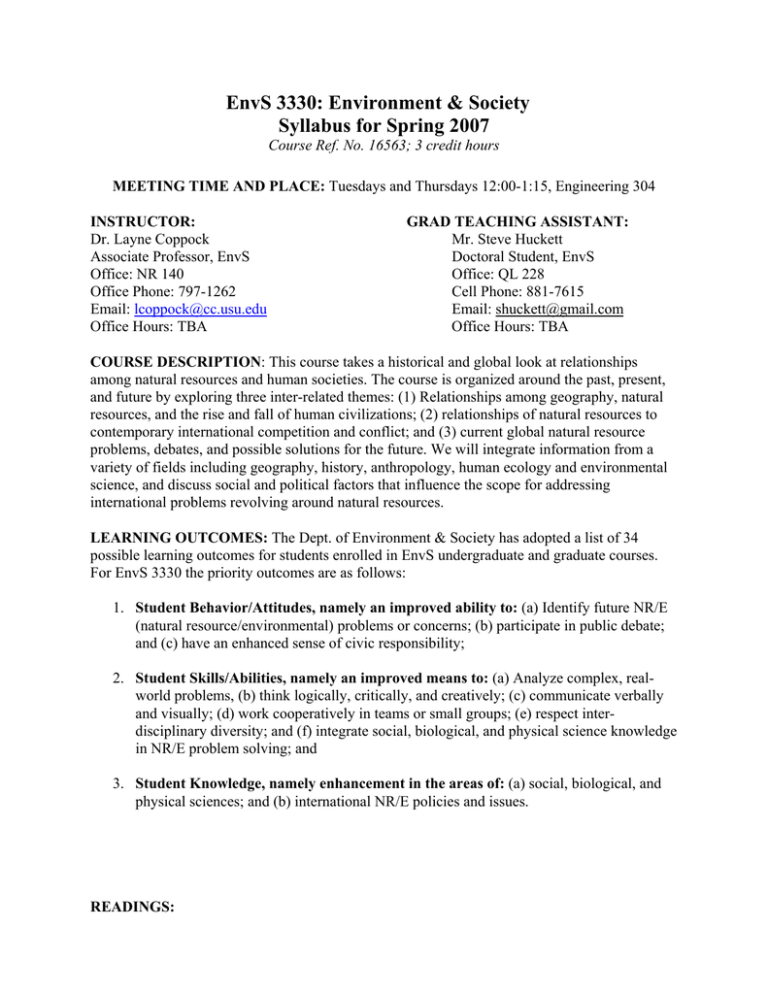
EnvS 3330: Environment & Society Syllabus for Spring 2007 Course Ref. No. 16563; 3 credit hours MEETING TIME AND PLACE: Tuesdays and Thursdays 12:00-1:15, Engineering 304 INSTRUCTOR: Dr. Layne Coppock Associate Professor, EnvS Office: NR 140 Office Phone: 797-1262 Email: lcoppock@cc.usu.edu Office Hours: TBA GRAD TEACHING ASSISTANT: Mr. Steve Huckett Doctoral Student, EnvS Office: QL 228 Cell Phone: 881-7615 Email: shuckett@gmail.com Office Hours: TBA COURSE DESCRIPTION: This course takes a historical and global look at relationships among natural resources and human societies. The course is organized around the past, present, and future by exploring three inter-related themes: (1) Relationships among geography, natural resources, and the rise and fall of human civilizations; (2) relationships of natural resources to contemporary international competition and conflict; and (3) current global natural resource problems, debates, and possible solutions for the future. We will integrate information from a variety of fields including geography, history, anthropology, human ecology and environmental science, and discuss social and political factors that influence the scope for addressing international problems revolving around natural resources. LEARNING OUTCOMES: The Dept. of Environment & Society has adopted a list of 34 possible learning outcomes for students enrolled in EnvS undergraduate and graduate courses. For EnvS 3330 the priority outcomes are as follows: 1. Student Behavior/Attitudes, namely an improved ability to: (a) Identify future NR/E (natural resource/environmental) problems or concerns; (b) participate in public debate; and (c) have an enhanced sense of civic responsibility; 2. Student Skills/Abilities, namely an improved means to: (a) Analyze complex, realworld problems, (b) think logically, critically, and creatively; (c) communicate verbally and visually; (d) work cooperatively in teams or small groups; (e) respect interdisciplinary diversity; and (f) integrate social, biological, and physical science knowledge in NR/E problem solving; and 3. Student Knowledge, namely enhancement in the areas of: (a) social, biological, and physical sciences; and (b) international NR/E policies and issues. READINGS: Required Texts: Diamond, Jared M. (1999.) Guns, Germs, and Steel: The Fates of Human Societies. NY: WW Norton. Klare, Michael T. (2001.) Resource Wars: The New Landscape of Global Conflict. NY: Henry Holt & Co. Rischard, J.S. (2002.) High Noon: 20 Global Problems, 20 Years to Solve Them. NY: Basic Books. Electronic Reserve: Additional readings may be handed out in class or placed on electronic reserve in the Sci Tech Library. The password to access the electronic reserve readings is BLA3330. Advance notice of such readings will be given in class. GRADING: Total possible points will be about 377. Letter grades will be based on the traditional point scale (A, A-, B+, B…etc.) and may be curved depending on class performance. Attendance will be taken at each class meeting. Absences can only be excused in the case of illness, emergency, and other scheduled course commitments and written documentation will be required. Opportunity to make up missed exams, etc., as a consequence of excused absences will be determined on a case-by-case basis. Missed work cannot be made up if absences are unexcused. Points will be distributed as: Three group projects/presentations (~8% or 30 points) Three mid-term exams (~53% or 200 points) Final exam (~20% or 75 points) Pop quizzes on pre-assigned readings (~8% or 30 points) Class participation/attendance (~11% or 42 points) DISABILITY RESOURCE CENTER: The university is required by law to help disabled students participate fully in all programs, activities, and services. If you have a disability, documented by the Disability Resource Center, that requires note-takers, interpreters for the deaf, extended testing time, etc., let the instructor know as soon as possible. The Disability Resource Center may also help provide course material in alternative formats like large print, Braille, and diskette. STUDENT ETHICS: The College of Natural Resources has adopted a “zero tolerance” policy for cheating and plagiarism on exams and term papers. The least that can happen to someone who engages in such behaviors is to fail the course. END OF SYLLABUS
